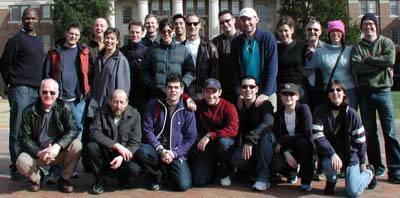
RSC in Davidson, February 19, 2002 ~ photo by Bill Giduz
in residence
The Royal Shakespeare Company is in residence at Davidson College. In their only trip to the U.S. in 2002, they have chosen The Merchant of Venice as the play they will present in eleven performances. The company arrived mid-month to begin what looks from here like a very ambitious visit. In addition to mounting Merchant, each day they have a handful of other engagements that include acting classes, academic classes, teacher training, and public school visits. Of particular interest are the master classes, "How Shakespeare's Text Helps the Actor," conducted by co-founder of the Royal Shakespeare Company, John Barton. He will work with a group of twelve student and professional actors. Over the course of four days, each actor will concentrate on a single sonnet. These classes are open to the public.
the matter of racism
The Merchant of Venice is a difficult play. As a comedy, it's blatant anti-Semitism would have been very broadly played in Shakespeare's time. Jews had been expelled from England in 1290, and only small groups of Marranos or Conversos, people who had converted to Christianity from Judaism, lived in England during the rule of Elizabeth I. A few years before The Merchant was written, a royal physician was accused of trying to poison the Queen. Robert Lopez was a Marrano, and his was a notorious case. He was publically and gruesomely executed, and bias against Jews was confirmed as a widely accepted form of bigotry.
Jews were regarded as fit targets for ridicule, suspicion, and contempt. The Jew was a stock comic character in Elizabethan theatre. If you can leave your political correctness at the door, Shylock will seem more clearly a villain and the play more a comedy. If modern sensibilities prevail, the play becomes infused with sympathy for this larger-than-life miser and misfit, and Shylock is revealed as, in part, a victim of social circumstance.
additonal reading
"A Second Daniel: The Jew and the "True Jew"
in The Merchant of Venice"
by Thomas H. Luxon, Dartmouth College
comparative interpretations of Shylock
as victim or villain
by Morriss Partee, University of Utah
![[ArtSavant motto]](http://www.artsavant.com/images/ArtSavmo.gif)
![[ArtSavant motto]](http://www.artsavant.com/images/ArtSavmo.gif)
![[ArtSavant link]](http://www.artsavant.com/images/ASavlink01.gif)